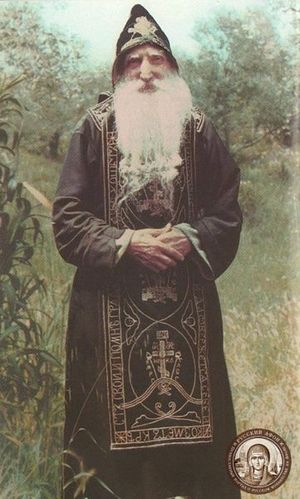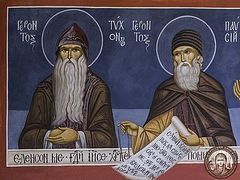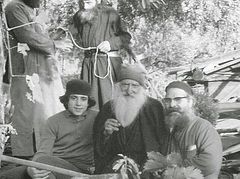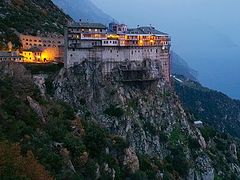Fifty years ago, on September 10/23, 1968, Hieromonk Tikhon (Golenkov), a true gem of the garden of the Holy Theotokos, an ascetic and spiritual father of the famous Holy Elder Paisios the Athonite, reposed in the Lord.
Fr. Tikhon (secular name: Timofey/Timothy Golenkov) was born in the village of Novaya Mikhailovka, Russia, to the family of Pavel and Elena Golenkov. From childhood he felt a strong call to monastic life; the future ascetic had travelled to a large number of Russian monasteries before he came of age. Then Timofey visited the Holy Land and prayed at its holy sites, after which the young ascetic arrived to Holy Mount Athos where he received the monastic tonsure with the name Tikhon in the cell of St. Nicholas at Burazeri1.
Five years later, aspiring for higher level of spiritual life, Monk Tikhon came to Karoulia2 where he spent fifteen years. He lived in a cave, ate once every three days, and devoted himself to prayer, reading, and prostrations. At that time he was under the spiritual guidance of one wise spiritual elder. While in Karoulia, Fr. Tikhon met two monks who kept an austere fast, did 1,000 prostrations a day, and died prematurely.
Fifteen years later, Monk Tikhon moved to one of the cells of Stavronikita Monastery at Kapsala3 and made his home in it. There he lived in obedience to one elder whom he cared for. Yielding to persuasion, Fr. Tikhon agreed to become a priest and father-confessor4, and built a little church in honor of the Exaltation of the Holy Cross.
At one time two young monks lived near Fr. Tikhon as his disciples for eight months. They strove to obey the rule of Fr. Tikhon, who emphasized that in the wilderness they were expected to glorify God and not just eat and sleep like animals. Throughout the week they had one meal a day without oil, and on Saturdays and Sundays Fr. Tikhon would add three tablespoons of oil into the pot. Each monk would take his portion of food and consume it inside his cell. Fr. Tikhon would say to them: “I bless you to take a second helping.” He was a man of great insight and took care of his young disciples.
After the frugal meal Fr. Tikhon would walk around his hut, loudly reciting Jesus Prayer with great fervor: “Lord Jesus Christ, have mercy upon me!” Prayer rhythmically came out from the depths of his heart. When asked, “How are you, geronda [the Greek word meaning “elder”]?”, Fr. Tikhon would answer: “My heart is inflamed in prayer.” His prayer was unceasing, continuing even in sleep, which is the highest state of soul. I sleep, but my heart waketh (S. of S. 5:2).
Fr. Tikhon and his disciples spoke very little with each other. At one time they didn’t say a word to one another for seventeen days! It is only during visits from guests that Fr. Tikhon invited both disciples so that they could benefit from being present at these spiritual talks.
When Elder Nektarios, nicknamed Karamanlis, came to Fr. Tikhon for the first time, the latter received him lovingly and offered him “the official meal”: Having picked a handful of olives from an olive tree, the elder brought them to Fr. Nektarios along with some coarse salt and wormy dried bread crusts (his own diet!); thereupon he left the guest alone, saying at parting in broken Greek: “I want to pray now.” The visitor ate the recluse’s simple food as Fr. Tikhon had treated him with love and open heart.
A very pious peddler from Karyes named Theodoros was Fr. Tikhon’s spiritual son. One day when this man came to Fr. Tikhon to confess his sins, the previous visitor told him that the elder had predicted that Theodoros would arrive after him and bring such-and-such a thing (and his prediction came true).
Once one man visited Fr. Tikhon and the elder said to him:
“My son, you have come not to me! You have come to find out if there are wild boars in this area!”
The elder took up needlework—he embroidered icons. It would take him up to two years to finish one icon. First Fr. Tikhon and his disciples would embroider one hour a day, then half an hour a day, and finally they gave up needlework.
Fr. Tikhon took special pains to avoid the sin of judging others. Whenever he sent his spiritual children to Karyes, he would go a mile with them. The path ran past the shack of one Russian neighbor. This neighbor, a priest, was an obese man, and Elder Tikhon advised the novices with fatherly love lest they should judge the man:
“When you see Fr. E., say to yourselves, ‘He is a holy man! May his prayers be with us!’”
The elder asked his disciples just to knock on the door of his cell (instead of disturbing him) after their arrival and immediately to proceed to their cells. One day one of the disciples out of an innocent curiosity looked inside the elder’s cell through the peephole, wondering what the ascetic was doing there. The disciple saw him weeping, wiping his tears with a handkerchief and hitting himself gently on the head.
The elder loved repentance despite the fact that he led a holy life and was dedicated to God from infancy. Tears were his daily nourishment. He had abundant tears and great tenderness in his heart. Like the woman from the Gospel, the elder would wash the Crucified Savior’s (depicted on his icon) feet with his tears and wipe them with his hair. In his cell the elder cultivated his inner spiritual life, nurturing repentance and godly sorrow that leads to joy. While hearing someone’s confession, Fr. Tikhon would begin to weep, showing heartfelt sympathy for the penitent. A student of the Athonite Academy5 who would confess his sins to Fr. Tikhon and afterwards became a priest recalled:
“This bald patch on my scalp was wetted by Fr. Tikhon’s tears.”
The elder usually celebrated the Liturgy every Sunday, though he always kept the Precious Gifts in his cell and took Communion daily. During the Liturgy people would see the elder’s face absolutely transformed, and his eyes seemed to be radiating light in the dark.
He celebrated the Divine Liturgy with compunction and tears. During the Divine Liturgy he read the Gospel with tears in his eyes.
It was with tears that Fr. Tikhon would also elevate the Holy Gifts and make the Great Entrance. He was frequently drawn up to heaven in spirit and had divine visions.
When Fr. Tikhon lived as a recluse, Elder Gerontius celebrated the Divine Liturgy for him; Fr. Tikhon would pay him ten drachmae [a former monetary unit of Greece, equal to 100 lepta, replaced in 2002 by the euro] for each Liturgy, while priests were normally paid five drachmae for each Liturgy. On one occasion Fr. Gerontius saw Fr. Tikhon lifted up above the ground.
“I have never seen a greater saint on the whole of Holy Mount Athos,” Fr. Gerontius admitted.
 Elder Tikhon (in the center) is receiving monks of one brotherhood. St. Paisios (in the background) is drawing water out of a barrel to offer it to the guests. 1966.
Elder Tikhon (in the center) is receiving monks of one brotherhood. St. Paisios (in the background) is drawing water out of a barrel to offer it to the guests. 1966. Elder Paisios6 related:
“Fr. Tikhon would lock the church door during the Liturgy in order to keep from getting distracted, and I would sing ‘Lord have mercy!’ outside in the corridor. One day at the moment of the consecration of the Eucharistic bread and wine during the Liturgy he fell silent. I waited for about five hours without calling out to the elder as he didn’t bless me to do that. Five hours later Fr. Tikhon proceeded with the exclamation, ‘Especially for the Most-Holy, Most-Pure, Most-Blessed…’ Where had he been all that time? I believe the elder had been drawn up to heaven in spirit. On that day the Divine Liturgy ended in the evening.”
The holy ascetic was totally unconcerned about external things. Thus, he never swept his cell. Earth and hair on the floor of his cell formed bumps like those on tortoise shell.
He made up to 3,000 prostrations a day and advised one monk:
“Do many prostrations until your undershirt gets sweat-soaked and you have to change it.”
Since the elder prayed much while standing, his feet were always swollen. He would observe a very strict fast and eat the same loaf of bread for a whole month. Once the elder told two monks to pick up strawberry tree (arbutus) fruit and cook it in a saucepan, but when he saw red juice he forbad them to do it anymore because “it contains too much blood”.
The holy man adored reading. He would read at least two to three hours a day and was filled with joy, saying: “Abba Isaac is so sweet!” Fr. Tikhon read all the writings of St. John Chrysostom two or three times.
The man of God would sleep very little at nights. At nightfall he would call the monks to prayer in church by banging on the wall. Before the midnight service they would worship in the little church and Fr. Tikhon himself sang. The elder commanded the monks to sit down at certain moments of the service, upon which they would proceed on their feet. They would pray for their benefactors and helpers and then return to their cells. Fr. Tikhon would say to his monks:
“I bless you to do as many prostrations as you wish. And, if you can, keep vigil all night long.”
Fr. Tikhon used to say that in monasteries you can find both those who are still learning monastic life and those who have already succeeded in achieving spiritual heights. Examples of the latter were Fr. Matthaeos (Matthew) of Karakallou Monastery, Fr. Athanasios of Iveron Monastery (he would confess his sins to Fr. Tikhon), and another Fr. Athanasios of Esphigmenou Monastery.
There is a short selection of Elder Tikhon’s sayings:
“After three years in a cenobium, a monk is ready for spiritual warfare.”
“Good habits are virtues, and bad habits are passions.”
“Let a monk not connect with animals because they will win his mind and heart and the monk will waste his love on animals instead of giving it wholeheartedly to God.” The elder pointed out that St. Basil the Great forbad monks to take Communion if they petted a cat or a dog shortly before that.
“The prayer, ‘Lord Jesus Christ, have mercy upon me!’ is the pure wheat.”
“A good, obedient monk will be able to acquire the habit of unceasingly repeating the Jesus Prayer.”
“If you don’t exercise caution while reading the Gospel, you may fall into delusion like Origen.”
“Better three prostrations with humility than 1,000 prostrations with arrogance. Only humility will save us! Few people have acquired humility of mind and it is almost impossible to find them!”
Elder Tikhon loved humility so much that he travelled the length and breadth of Mt. Athos in search of a humble man. At long last he found an elder at Esphigmenou Monastery who was arrayed in true and perfect humility. True, there were other humble elders too, but they were hidden from our eyes. Fr. Tikhon was frequently invited to Esphigmenou Monastery to hear its monks’ confessions (then the community numbered over sixty members).
The elder particularly venerated St. Anthony of the Caves and used to celebrate the Liturgy in the cave where the venerable father lived. After that Fr. Tikhon would return to his cell (the elder walked very fast). He was on friendly terms with St. Silouan the Athonite, who after his repose appeared to Fr. Tikhon and conversed with him.
An elder from Karyes related:
“Fr. Tikhon was very simple and lived in his own world. He exerted enormous spiritual effort. Although Fr. Tikhon was a great faster, he was strongly built. Whenever he came to our cell and we offered him some food, he only took two spoons as a blessing. There are no elders like him any more, so it is no use trying to find them.”
Once Fr. Tikhon told his monks not to open his grave after his death7. But one of the monks thought: “I will exhume his body all the same and say, ‘Bless me!’” His thought was revealed to the elder and he said instantly:
“There is no blessing for this!”
And his precious relics remain buried to this day, awaiting the general resurrection. The righteous man fell asleep in the Lord on September 10/23, 1968. Shortly before his repose Fr. Tikhon saw the Holy Theotokos together with Sts. Sergius of Radonezh and Seraphim of Sarov in a vision, and they promised to meet him in eternity after the feast of the Nativity of the Mother of God. Elder Paisios, his disciple, was with him in his last days. The Venerable Paisios attended up on Fr. Tikhon, buried him, became his successor in the hermitage cell, and later wrote down his Life, which was published after his (Fr. Paisios’s) death. May his prayers ever be with us! Amen.





